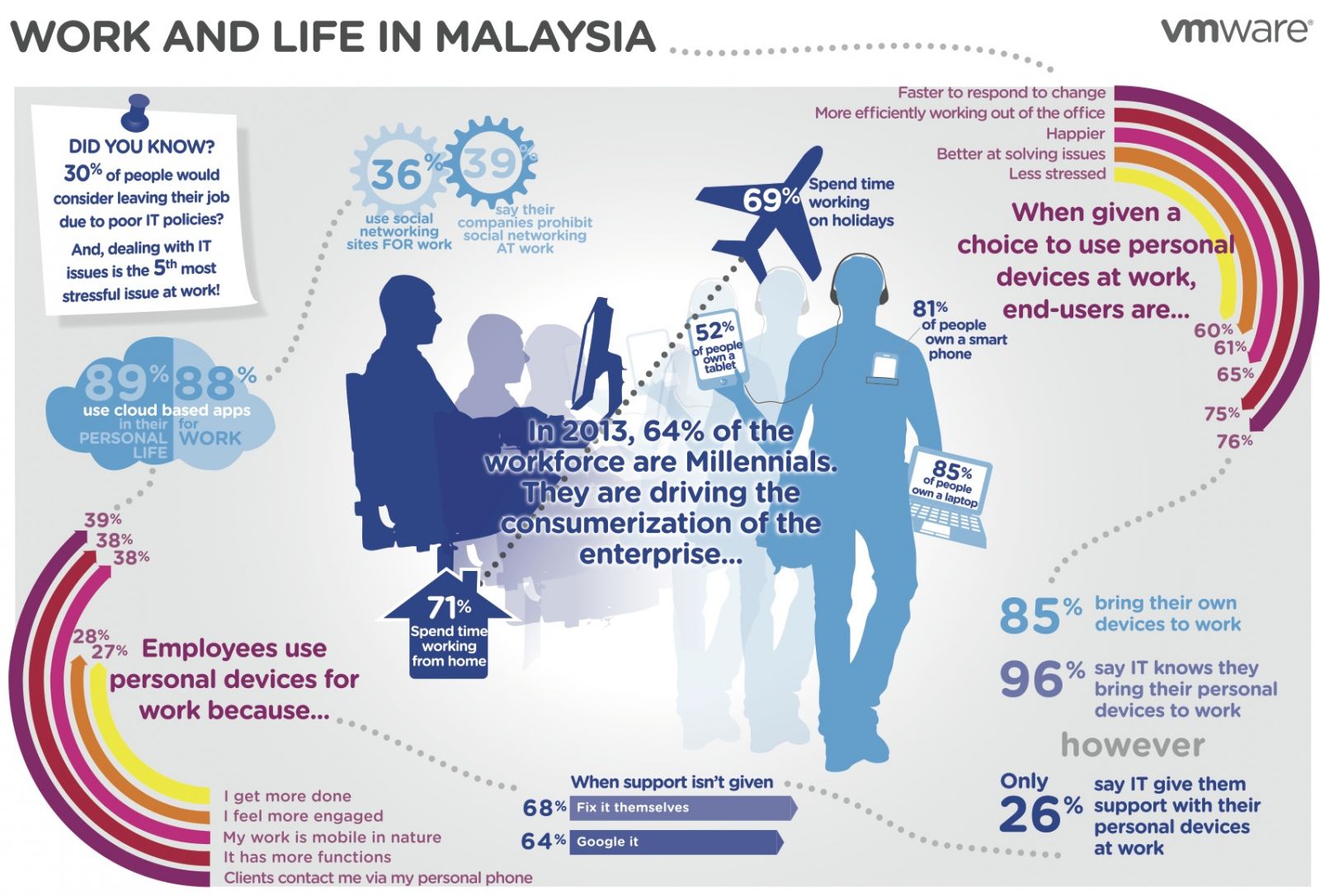Malaysians are all for BYOD, but their IT depts aren't: Survey
By Edwin Yapp March 4, 2013
- Malaysian IT departments in favor of locking down their infrastructure rather than embracing BYOD
- Root cause may be their inability to deal with BYOD trend technologically and procedurally
DESPITE this year being touted as the 'bring your own device' (BYOD) year, enterprises in Malaysia appear to be resistant to such developments because of their inability to manage the necessary transitions needed to embrace the trend within their organizations.
According to VMware’s Asia Pacific “New Way Of Life Study 2013,” nine in 10 respondents say their corporate IT department know they bring their own devices to work but at the same time, their companies restrict staff from connecting their devices to the corporate network.
Speaking to the media at a briefing last week, Laurence Si, country manager of VMware Malaysia, said the figures reported by this year’s survey had increased since they started conducting the survey last year. As with the 2011 survey, it was commissioned by VMware and conducted by Acorn Research.
 Si (pic) noted that in the 2011 survey, 91% of the respondents said their IT staff know about them bringing their own devices; in 2012, this figure increased to 96%.
Si (pic) noted that in the 2011 survey, 91% of the respondents said their IT staff know about them bringing their own devices; in 2012, this figure increased to 96%.
Also in the corresponding periods, 89% of respondents felt that IT departments restricted staff from connecting to the corporate network, and this increased to 92% in 2012.
The survey covered 12 countries in Asia Pacific, including Australia, China, Japan and South Korea, as well as Asean countries such as Malaysia, Singapore and Thailand. For the first time, Indonesia and the Philippines were also included in the survey.
In total, there were 2,100 respondents between the ages of 18 and 64 years who were employed at companies with more than 1,000 staff globally; worked at least 15 hours a week; and used their computers both at home and at work. The sample size for Malaysia was 150.
When asked, VMware's Si candidly admitted he did not know why companies whose employees took part in the survey had such tight controls despite knowing that the BYOD trend is here to stay.
“If you ask me, I don’t know the reason. What I can see from this is that IT has not responded to the BYOD trend very well,” he said. “It could be because they are not familiar with the solutions that are available [to help them manage it].”
Si said that the BYOD trend does bring with it certain challenges, such as control, or the lack thereof.
Notwithstanding this, he was quick to point out that chief information officers (CIOs) with whom he has been speaking are aware of the trends and are prepared to engage and find out more about the kind of solutions that are in the market to help them with the BYOD transition.
Raymond Lau, senior systems engineer for VMware, said that companies today may choose to err on the safe side and as such, may prefer to ban the use of such personal devices.
“Companies may not be ready to take on BYOD,” he said at the briefing. “So the only way to stop it, is to really stop it from being a part of the network.”
 The New Way of Life Survey also revealed that respondents in Malaysia do not get the IT support they need to make BYOD work in their organizations. Consequently, 68% say they would take matters into their own hands by finding their own solutions, while 64% say they would turn to Google to find an answer to their problems.
The New Way of Life Survey also revealed that respondents in Malaysia do not get the IT support they need to make BYOD work in their organizations. Consequently, 68% say they would take matters into their own hands by finding their own solutions, while 64% say they would turn to Google to find an answer to their problems.
A common example of this is the use of the popular cloud storage software Dropbox, Si noted.
“People want the same kind of features and ease of use that Dropbox provides but can’t get these conveniences,” he said. “So they resort to using such software but there are security, privacy and compliance issues that could be violated by using a software that is outside an organization’s infrastructure.”
He also said the most common response by organizations is to do either one or more of three things: Ignore it; lock it down or buy a point solution, which may not address the BYOD challenge holistically.
“The real solution is to re-look at IT policies and keep an open mind,” Si said. “Virtualization and cloud technologies can help companies adapt to BYOD, and this is what organizations should look at.”
Besides these findings, the study (see above, click to enlarge) also revealed the following about Malaysian respondents in the survey:
- 85% bring their own devices to work;
- Only 26% say IT gives them support with their personal devices at work;
- 76% say they are faster to respond to change when they can use their own choices of portable devices at work (69% the previous year);
- 61% say they are better at solving issues when they can use their own choices of portable devices at work (51% the previous year); and
- 69% of say they are happier in their role when allowed to use own devices/ social apps to complete work tasks (69% the previous year).
New suite launched
At the briefing, VMware also unveiled its Horizon Suite, which the company claims is a comprehensive platform for workforce mobility that will connect end-users to their data, application and desktops on any device without sacrificing IT security and control.
Lau said the Horizon Suite comprises three products – Horizon View, a complete desktop and application virtualization tool; Horizon Mirage, a layered Windows image management system; and Horizon Workspace, a multi-device workspace for IT services.
Si said these suites, working in concert with other VMware products, can help solve the BYOD challenges faced by today’s enterprises, including the aforementioned issues identified.
VMware Horizon Suite will be licensed per named user with prices starting at US$300. All of the Horizon Suite Products will also be sold individually. For more information, go here.
Related stories:
Welcome to the new world of working
The coming of BYOD and its challenges
Gen-Y ‘BYOD’ workers have low regard for corporate IT security
AsiaPac up on BYOD cost-savings, down on innovation benefits
For more technology news and the latest updates, follow @dnewsasia on Twitter or Like us on Facebook.


